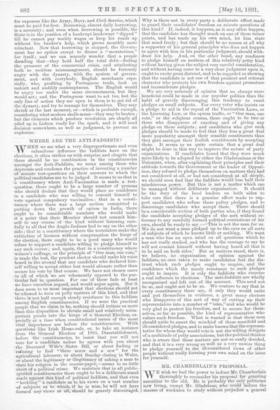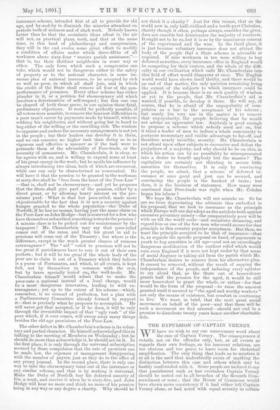MR. CHAMBERLAIN'S PROPOSAL.
WE wish we had the power to induce Mr. Chamberlain thoroughly to reconsider his proposal for granting annuities to the old. He is probably the only politician now living, except Mr. Gladstone, who could induce the masses of workmen to study without prejudice a general insurance scheme, intended first of all to provide for old. age, and by-and-by to diminish the miseries attendant on periods both of sickness and of slack work. Nobody knows better than he that the socialistic ideas afloat in the air will not, as practical plans, work, and that at the same time, in this land of philanthropy and compromises, they will in the end evolve some great effort to modify a condition of affairs under which three-fifths of all workmen above sixty-four " receive parish assistance,"— that is, tax their thriftier neighbours in some way or other. The only form which such a compromise can take, which would not be dangerous either to the safety of property or to the national character, is some im- mense plan of national insurance, to be accepted by rich as well as poor, in which all shall join, and in which the credit of the State shall remove all fear of the non- performance of promises. Every other scheme has either pluuder in it, or a petition for eleemosynary aid which involves a deterioration of self-respect ; but this one can be cleared of both those grave, in our opinion those fatal, preliminary objections. It would be perfectly possible, if all voters were sensible, to remove the heaviest difficulties in a poor man's career by payments made by himself, without robbing his neighbours, and without going hat in hand to beg either of the willing or the unwilling rich. The wisdom to organise and endure the necessary arrangements is not yet in the people ; but their leaders can develop it in them, and we can conceive no higher task than doing so in as vigorous and effective a manner as if the task were to persuade them of the advisability of Free-trade, or the necessity of armaments. Mr. Chamberlain, it is clear, so far agrees with us, and is willing to expend some at least of his great energy in the work; but he spoils his influence by always introducing two ideas, both of which are erroneous, while one can only be characterised as nonsensical. He will have it that the pension to be granted to the workman at sixty-five shall be " free from the taint of the Poor-Law " —that is, shall not be eleemosynary—and yet ho proposes that the State shall give part of the pension, either by a direct grant, or by allowing heavy interest on the pre- miums paid. What is that but poor-relief, made more objectionable by the fact that it is not a security against hunger granted to the whole population—the Duke of Norfolk, if he has no means, having just the same claim on the Poor-Law as John Hodge—but is reserved for a few who have themselves subscribed something towards the pension ? A minute class is to be picked out for maintenance by the taxpayers ! Mr. Chamberlain may say that poor-relief comes out of the rates, and that his grant in aid to pensions will come out of the Treasury ; but where is the difference, except in the much greater chance of ruinous extravagance ? The " aid " voted to pensions will not be too great if parishioners have to vote it out of their own pockets ; but it will be too great if the whole body of the poor are to claim it out of a Treasury which they believe is a purse of Fortunatus, and which, at all events, is kept full, not by themselves in common with the rest, but by taxes specially levied one the well-to-do. Mr. Chamberlain himself would admit that to make the poor-rate a national instead of a local charge, would he a most dangerous innovation, leading to wild ex- travagance ; yet up to the extent of his scheme—which, remember, is no counsel of perfection, but a plan with a Parliamentary Committee already formed to support it—that is precisely what he proposes to accomplish. He will never get that accepted, or if he does, it will be only through the irresistible impact of that "ugly rush" of the poor which, if it ever comes, will sweep away many things besides the old-age provisions of the Poor-Law.
The other defect in Mr. Chamberlain's scheme is its volun- tary and partial character. He himself acknowledged this in talking to the meeting of Members on Wednesday ; but he should do more than acknowledge it, he should act on it. In the first place, it is only through the universal subscription secured: by State compulsion that the rate of premium can be made low, the expenses of management disappearing with the number of payers, just as they do in the office of any penny journal. In the second place, there is only one way to take the eleemosynary taint out of the insurance or any similar scheme, and that is by making it universal. Make the Duke of Norfolk buy his deferred annuity of 10s. a week, and receive it when lie is sixty-five, and John Hodge will hear no more and think no more of his pension being in any way or any degree a charity. Why should he not think it a charity ? Just for this reason, that as the world now is, only half-civilised and a tenth-part Christian, charity though it often, perhaps always, ennobles the giver, does not ennoble but deteriorates the majority of receivers. It ought not to be so, but it is so by the unanimous consent of the experienced and the wise. In the third place, it is just because voluntary insurance does not attract the body of the people that a State scheme is advisable or required. If nine workmen in ten were willing to buy deferred annuities, every insurance office in England would be competing for their custom, and the whole of the diffi- culty in our civilisation which calls Mr. Chamberlain into this field of effort would disappear at once. The English world would. have shown itself thrifty, and there would be an end of that matter, the only question remaining being the extent of the subjects to which insurance could be applied. It is because there is no such quality of wisdom as yet in the people, that Mr. Chamberlain's aid is wanted, if possible, to develop it there. He will say, of course, that he is afraid of the unpopularity of com- pulsion as a bar to the acceptance of his scheme ; but surely his very use in the matter is to remove that unpopularity, the people believing that he would not advise an oppressive law. Anybody is good enough to propose a scheme which nobody need act on, kit it takes a leader of men to induce a whole community to postpone momentary and visible advantage to far-off, and therefore nearly invisible, security. Mr. Chamberlain is not afraid upon other subjects to encounter and defeat the prejudices of a majority, and why should he be on this, in which his action can by no possibility be misrepresented into a desire to benefit anybody but the masses ? The capitalists are certainly not thirsting to secure little annuities for themselves. It is only by convincing the people, we admit, that a scheme of deferred in- surance at once great and just can be secured, and convincing the people is the hardest of tasks ; but then, it is the business of statesmen. How many were convinced that Free-trade was right when Mr. Cobden began his labour ?
We hope Mr. Chamberlain will not mistake us. So far are we from depreciating the ultimate idea embodied. in his proposal, that we look to insurance as the principle which Europe will one day adopt as the antidote both against excessive pecuniary misery—the comparatively poor will be with us till the world. cools—and socialistic dreaming, and regard him as one of the few men who could secure for that principle in this country popular acceptance. But then, we want the principle accepted to be that of insurance—that is, as regards the specific proposal on hand, of payments in youth to buy annuities in old age—and not an exceedingly dangerous modification of the outdoor relief which would ruin even England if it were not kept under by that sense of social disgrace in taking aid from the parish which Mr. Chamberlain desires to remove from his alternative plan. It cannot be removed, without the result of sapping the independence of the people, and inducing every agitator to cry aloud that, as the State out of benevolence grants half the pension for the aged, it would be still more benevolent to grant the whole, or rather—for that would be the form of the proposal—to raise the amount granted until it secured to " the aged and worthy workers " not only the means of existence, but comfort in continuing to live. We want, in brief, that the next great social movement on behalf of the poor—and that there will be such a movement we feel assured—should not end in a promise to distribute twenty years hence another charitable dole.



































 Previous page
Previous page